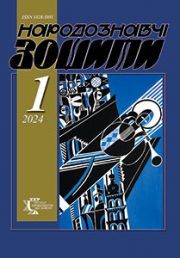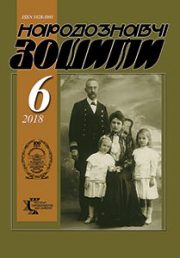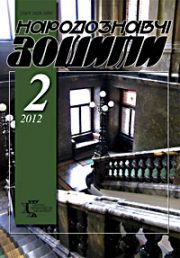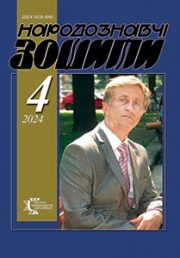The Ethnology Notebooks. 2018, 6 (144), 1603–1609
UDK 75/76].071.1+7.071.4](477)”19″:75.021.32-035.676.332.2(477)”19″
DOI https://doi.org/10.15407/nz2018.06.1603
Received 21.11.2018
ORCID ID: https://orcid.org/0000-0002-4623-6444
Zinchuk Olha, PhD student,
The Lviv National Academy of Arts.
38 Kubiiovycha Str., 79011, Lviv, Ukraine.
Contacts: e-mail: zinchukolga222@gmail.com
Abstract. Among the well-known classics who contributed to the rise of the Ukrainian art in Lviv in the 20th century, Olena Kulchytska should be mentioned. She experienced a tough time of cultural enslavement of the Ukrainian people, marked by a change of historical and political systems. Despite this the artist encapsulated an optimistic view of life in her works. The works of the artist facilitated the immersion of the artists of Lviv in the mood of Art Nouveau and expressionism with the intonation of ethnic and national traditions.
Problem Statement. The works of O. Kulchytska (1877—1967), anartist, teacher, patriot, social activist and author of over 6000 works of art, People’s Artist of the UkrSSR (since 1956), a Deputy of the Verkhovna Rada of the UkrSSR of the 3rd and 4th convocations, laureate of Taras Shevchenko state prize of the UkrSSR (1967) are a bright phenomenon with an ethnic and national zest in the artistic life of Lviv in the 20th century. O. Kulchytska is a mouthpiece of the brilliant group of Ukrainian artists. She was brought up in an educated family which was always concerned about the fate and the dignity of its people. In her watercolor works, the artist is fascinated by the beauty of her native lands, aesthetically glorifies the mode of life and nature of her native land. Actively using various genres of art, O. Kulchytska enriches the subjects with secessionist and allegorical interpretations. The artist has developed an individual creative method, which was crystallized through the lens of artistic search and life experience. Training at the art institutions, accompanied by numerous trips to Ukraine and abroad influenced greatly the genesis of O. Kulchytska’sart. The study of watercolor oeuvre created in the late period of the artist’s work helps to reinvent the significance of the recorded ethno material and trace the moment of formation of the creative method.
The academic research, covered in this paper, is conducted as a part of the thesis research: «Water color Painting in the System of Fine Arts of Lviv of the second half of the 20th — early 21st centuries: Typology, Functional Area, Artistic and Aesthetic Features». The paper focuses on the important but under studied final period of the artist’s work. The subject is induced by an important aspect of the history of the water color tradition of Lviv artistic community, and the influence of a significant artistic heritage of O. Kulchytska on the developments in the context of art activities of subsequent generations of water colorists.
Purpose — to analyze pieces of water color painting using the variety of genres of the artistic heritage of O. Kulchytska in the light of art of the 20th century Galicia; to reveal the peculiarities of the artistic language; to highlight the significance of the personal contribution of the artist to cultural and artistic life of Lviv artistic community; and to assess the importance of educational activities at art educational institutions.
Methods.To establish the course of artistic events in the context of the Lviv artistic community of the 20th century the author applies the historical method. A descriptive method was used to determine the figurative and stylistic features in the watercolor sheets and to highlight the genesis of the individual creative method of O. Kulchytska. The author used the archival documents and examined the original works.
Results, Conclusion. A few points should be mentioned. Olena Kulchytska is one of the prominent representatives of Ukrainian art of the 20th century. Her influence on the formation and development of the artistic life of Lviv and the overall art situation in Ukraine is undeniable. The works of the artist are light, balanced and clearly arranged. Compositional solutions are interpreted mainly through the planar representation of the image, adorned with the expressive lines and blots of color. The artist uses the «classic» sound of color. The sheets reveal the theosophical, mythological and allegorical subtext. Mature works, in particular historical compositions, bear patriotic sounding.
As a teacher with many years of experience, through creative process and new interpretations of ethno traditions O. Kulchytska for a long time has been embodying a certain thrust, which was a guidepost for the generation of young artists.
In addition to the significant oeuvre, which has not only aesthetic and spiritual, but also cultural and historical value, the artist has always clearly outlined her human and civic stance. O. Kulchytska helped the compatriots who were oppressed during the second Soviet occupation, applied for the release from arrest of cultural figures, defended the artschool — Lviv School of Applied Art. A magnanimous patriotic act was the will of the artist, according to which she transferred her numerous works — about six thousand pieces of fine art — to the Ukrainian people. Today, the collection of her works is stored at the Lviv Andrei Sheptytskyi National Museum, and the selected works of art are available at the permanent and removable exhibitions of the Olena Kulchytska Artistic and Memorial Museum. Having a high deserved standing in the community among the contemporaries, the artist was often in difficult situations, acting as a mediator in a variety of sometimes incendiary cultural and political issues.
Search for innovations in the work of Olena Kulchytska in its artistic manifestation embodied the phenomenon which in the European community could be created only by efforts of a group of artists; and the national and ideological orientation of works occupies a significant niche in the cultural spectrum of Art Nouveau.
Keywords: the phenomenon of O. Kulchytska, teacher, socialactivist, painter, graphicartist, water color technique, water color sheets, study, Lviv artistic community, Art Nouveau, ethno-national tradition.
REFERENCES
Krypiakevych, I. (1916, 30 chervnia). Ukraiinskyi derevoryt i tvory Oleny Kulchytskoii. Shliakhy, 419–424 [in Ukrainian].
Holubets, M. (1917). Olena Kulchytska. Z pryvoduyiii voiennykh kartyn. Striletskyi kalendar-almanakh artystychnoii horstky i presovoii kvatyry U. S. S. v poli. Lviv [in Ukrainian].
Drahan, M. (1943, cherven). Vystavka prats O. Kulchytskoii. Nashi dni (Ch. 6). [in Ukrainian].
Olena Kulchytska. (1933). In M. Osinchuk, M. Holubets (Eds.). — Lviv: Vyd-vo ANUM [in Ukrainian].
Seniv, I.V. (1961). Tvorchist Oleny Lvivny Kulchytskoii. Kyiiv: Vyd-vo AN URSR [in Ukrainian].
Kasiian, V., & Turchenko, Yu. (1961). Ukraiinska dozhovtneva realistychna hrafika. Kyiiv: Vyd-vo AN URSR [in Ukrainian].
Viunyk, A. (1969). Olena Kulchytska. Kyiiv: Mystetstvo [in Ukrainian].
Narodoznavchi zoshyty (2001), 1 (37) [in Ukrainian].
Olena Kulchytska (1887—1967). (2013). In L. Kost, T. Rizun (Eds.). Hrafika. Zhyvopys. Uzhytkove mystetstvo: albom-kataloh. Natsionalnyi muzei u Lvovi imeni Andreia Sheptytskoho. Lviv; Kyiiv: Apriori [in Ukrainian].
Zhyvopys. Hrafika. Skulptura. 1900—2008: albom (2008). In P. Marusenko, K. Tarchevskoii (Eds). Mystetska mapa Ukraiiny: Lviv. Muzei suchasnoho obrazotvorchoho mystetstva Ukraiiny. — Kyiiv: Yuvelir-pres [in Ukrainian].
Holubets, O.M. (2012). Mystetstvo dvadtsiatoho stolittia: ukraiinskyi shliakh. Lviv: Kolir PRO [in Ukrainian].
Yatsiv, R.M. (2006). Ukraiinske mystetstvo dvadtsiatoho stolittia: Ideii, yavyshcha, personaliii. Zbirnyk statei. Lviv: Afisha [in Ukrainian].
Shmahalo, R.T. (2005). Mystetska osvita v Ukraiini seredyny deviatnadtsiatoho — seredyny dvadtsiatoho st.: strukturuvannia, metodolohiia, khudozhni pozytsiii. Lviv: Ukraiinski Tekhnolohiii [in Ukrainian].







